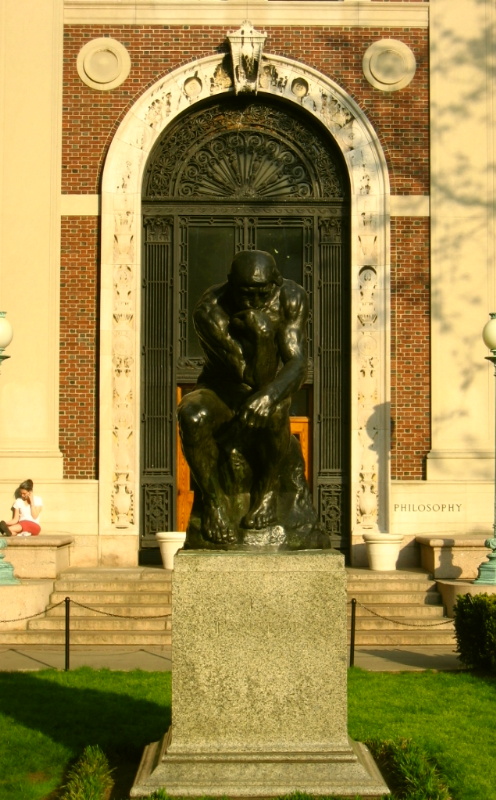- Philosophy Hall
Infobox nrhp
name = Philosophy Hall
nrhp_type = nhl
caption = Rodin's "The Thinker " with Philosophy Hall in the background
location = 1150 Amsterdam Ave.,Columbia University ,Manhattan ,New York City , NY
nearest_city =
lat_degrees = 40 | lat_minutes = 48 | lat_seconds = 22 | lat_direction = N
long_degrees = 73 | long_minutes = 57 | long_seconds = 45 | long_direction = W
area =
built = 1910
architect =McKim, Mead and White
architecture =Italian Renaissance Revival
designated=July 31 ,2003 cite web|url=http://tps.cr.nps.gov/nhl/detail.cfm?ResourceId=1153784502&ResourceType=Building
title=Philosophy Hall|date=2007-09-18|work=National Historic Landmark summary listing|publisher=National Park Service]
added =July 31 ,2003 cite web|url=http://www.nr.nps.gov/|title=National Register Information System|date=2007-01-23|work=National Register of Historic Places|publisher=National Park Service]
visitation_num =
visitation_year =
refnum = 03001046
mpsub =
governing_body =Columbia University Philosophy Hall is a building on the campus of
Columbia University inNew York City . It houses the English, Philosophy, and French departments, along with the university's writing center, part of its registrar's office, and the student lounge of its Graduate School of Arts and Sciences. It is one of the original buildings designed for the university'sMorningside Heights campus byMcKim, Mead, and White , built in the Italian Renaissance Revival style and completed in 1910. Philosophy Hall is listed on the National Register of Historic Places and has been designated aNational Historic Landmark as the site of the invention ofFM radio byEdwin Armstrong in the early 1930s.The space now occupied by the registrar formerly housed
electrical engineering laboratories in whichMichael I. Pupin andEdwin Howard Armstrong made several major technological breakthroughs. Over the years the building has been home to such notable faculty members as philosophersJohn Dewey , Frederick J. E. Woodbridge andErnest Nagel , Guadeloupean novelistMaryse Condé , French literary scholarMichael Riffaterre , poetKenneth Koch and English literary scholarsLionel Trilling ,Edward Said ,Carolyn Heilbrun ,Quentin Anderson ,Gayatri Chakravorty Spivak andMark Van Doren .Philosophy Hall was not occupied by protesters during the 1968 protests. It served instead as a refuge for faculty and a site of contentious debates among them concerning student conduct.
The lawn in front of Philosophy Hall is the site of an original cast of "
The Thinker " ("Le Penseur"), one of the most famous pieces by French sculptorAuguste Rodin .The hall was designated a
National Historic Landmark in 2003.,citation|title=PDFlink| [http://pdfhost.focus.nps.gov/docs/NHLS/Text/03001046.pdf National Historic Landmark Nomination: Philosophy Hall] |407 KB|author=Robert D. Colburn |date=July, 2002|publisher=National Park Service and PDFlink| [http://pdfhost.focus.nps.gov/docs/NHLS/Photos/03001046.pdf "Accompanying 13 photos, exterior and interior, from c.1922-2001"] |2.40 MB]It is one of only a handful of buildings on the Columbia campus named for an academic discipline, and not an individual. The others include Mathematics, Journalism, International Affairs, and Law.
References
* [http://www.cr.nps.gov/nhl/designations/samples/ny/Philosophy%20Hall-Final.pdf National Historic Landmark Nomination] History and description, page 4 of 21
Wikimedia Foundation. 2010.

